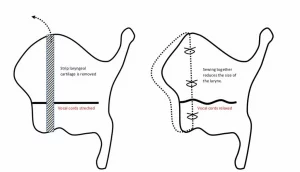Hoarseness is one of the most common reasons people seek help from specialists like Mr Nick Hamilton. While often harmless, persistent hoarseness can sometimes indicate underlying conditions that require professional attention from an experienced laryngologist.
Mr Hamilton, who practices at The London Clinic and One Welbeck, completed advanced training in complex voice disorders at the MGH Voice Center in Boston and has particular expertise in diagnosing serious voice conditions.
What exactly is hoarseness?
Hoarseness refers to an abnormal change in your voice quality, making it sound rough, strained, or different from normal. It occurs when your vocal cords don’t vibrate properly, affecting the sound your voice produces.
Common descriptions include a raspy, breathy, or weak voice quality. Some people describe their hoarse voice as sounding like they’ve been shouting or have a perpetual cold.
The condition can range from mild roughness to complete voice loss, depending on the underlying cause and severity of vocal cord irritation.
When should hoarseness concern me?
Hoarseness lasting more than two weeks requires evaluation by a laryngologist like Mr Hamilton. This timeframe is crucial because most common causes, such as viral infections or vocal strain, typically resolve within this period.
You should seek immediate consultation if hoarseness is accompanied by difficulty swallowing, persistent throat pain, or breathing problems. These symptoms could indicate more serious conditions requiring urgent attention.
Research shows that approximately 21% of adults experience hoarseness annually, but only a small percentage represents serious underlying conditions that require specialist intervention.
What serious conditions can cause hoarseness?
Mr Hamilton regularly diagnoses various conditions that can cause persistent hoarseness during consultations at The London Clinic and One Welbeck. Vocal cord nodules or polyps are common benign growths that develop from vocal abuse or overuse.
More serious causes include vocal cord paralysis, which can result from nerve damage affecting vocal cord movement. This condition requires specialist intervention and often responds well to the targeted treatment approaches that Mr Hamilton offers.
Rarely, hoarseness can be an early sign of throat cancer, particularly in people with risk factors such as smoking or excessive alcohol consumption. Mr Hamilton’s training and expertise enable him to identify these concerning signs during examination.
How does Mr Hamilton diagnose the cause?
Mr Hamilton uses advanced diagnostic techniques to identify the root cause of hoarseness. Video laryngoscopy allows direct visualisation of your vocal cords, revealing any structural abnormalities or movement problems.
He also performs comprehensive voice analysis tests, measuring various aspects of your vocal function to create a complete picture of your voice quality and capabilities.
His PhD research into voice box scarring and tissue damage provides additional insight into complex cases that other practitioners might miss.
Can lifestyle factors contribute to serious hoarseness?
Professional voice users, including teachers, singers, and public speakers, face higher risks of developing voice problems that can become serious without proper management. Mr Hamilton’s fellowship training in professional voice care makes him particularly qualified to treat these patients.
Smoking, excessive alcohol consumption, and chronic acid reflux are significant risk factors that can transform temporary hoarseness into persistent problems requiring specialist intervention.
What treatment options does Mr Hamilton offer?
Mr Hamilton offers various treatment approaches depending on the underlying cause. Many cases respond well to voice therapy, which teaches proper vocal techniques and helps prevent future problems.
More complex cases might require surgical intervention or medical management, particularly when hoarseness results from structural problems or serious underlying conditions. His surgical training in complex voice disorders enables him to offer advanced treatment options.
Early consultation with Mr Hamilton often leads to more conservative treatment options and better long-term outcomes for patients experiencing persistent hoarseness. You can book a consultation by calling 020 7034 6053.



